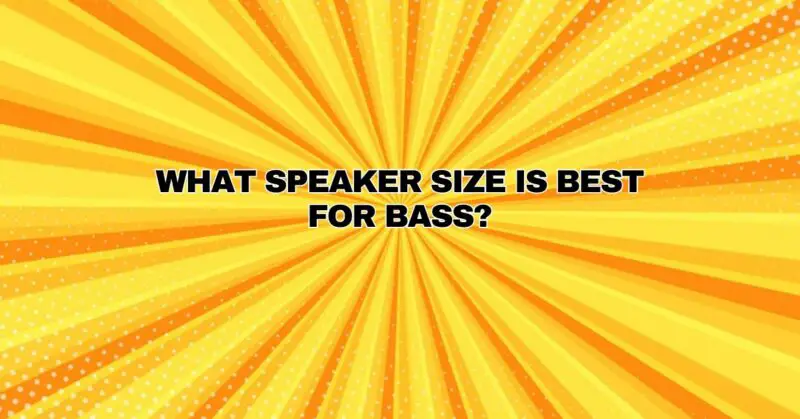When it comes to audio systems, especially those focused on delivering powerful and impactful bass, the choice of speaker size plays a crucial role. The size of the speakers you select can significantly influence the depth, resonance, and overall quality of the bass you experience. In this comprehensive guide, we’ll explore the relationship between speaker size and bass performance, helping you determine the best speaker size for your bass-centric audio needs.
Understanding Speaker Size:
Speakers come in various sizes, typically measured in inches for the diameter of their woofers (the driver responsible for producing bass frequencies). Common speaker sizes include 8-inch, 10-inch, 12-inch, and 15-inch. Here’s a breakdown of each size and its characteristics:
- 8-Inch Speakers: These are often found in smaller audio setups or as part of a component speaker system. While they can produce bass, their emphasis is generally on mid-range frequencies. They are suitable for compact spaces or when a smaller footprint is essential.
- 10-Inch Speakers: 10-inch speakers strike a balance between size and bass performance. They are versatile and can deliver decent bass output without being too large. They are commonly used in car audio systems and home audio setups.
- 12-Inch Speakers: Considered a standard size for many audio enthusiasts, 12-inch speakers are known for their ability to produce robust and well-defined bass. They are suitable for a wide range of applications, including home theaters and car audio.
- 15-Inch Speakers: If you’re seeking powerful and thunderous bass, 15-inch speakers are hard to beat. They excel at producing deep, room-filling bass but are often larger and require more space.
Factors Influencing Speaker Size Choice:
- Listening Environment: The size of your listening space matters. Smaller rooms may not benefit from large 15-inch speakers, as they can overpower the space. Conversely, larger rooms may require larger speakers to fill the area with bass effectively.
- Music Genre: The type of music you primarily listen to can influence your speaker size choice. If you enjoy genres with prominent bass, like hip-hop or electronic dance music (EDM), larger speakers may be preferable.
- Frequency Range: Consider the full range of frequencies you want your speakers to reproduce. Larger speakers tend to excel in the lower bass frequencies, while smaller ones may be better suited for mid-range frequencies.
- System Compatibility: Ensure that your audio system, whether it’s a home theater receiver, car audio amplifier, or studio monitor, can adequately power and support the chosen speaker size.
- Space and Aesthetic Considerations: Consider the physical space you have available for your speakers and how their size fits into your room’s aesthetics. Larger speakers can be visually imposing, while smaller ones offer a more discreet presence.
Balancing Size and Performance:
The relationship between speaker size and bass performance is not linear. While larger speakers have the potential to produce deeper and more powerful bass, it’s crucial to strike a balance that suits your specific needs and constraints. Here are some tips:
- Subwoofers: For dedicated and powerful bass, consider incorporating a subwoofer into your audio system. Subwoofers are specialized speakers designed exclusively for reproducing low-frequency bass, and they come in various sizes, including 8-inch, 10-inch, and 12-inch models.
- Multiple Speakers: If space allows, you can use a combination of speakers to cover the entire frequency range effectively. For instance, you might use smaller speakers for mid-range and treble frequencies and a separate subwoofer for deep bass.
- Room Acoustics: Pay attention to room acoustics and consider using acoustic treatments, bass traps, and proper speaker placement to optimize bass performance.
- Quality Matters: The quality of your speakers is paramount. High-quality speakers, regardless of size, will reproduce bass more accurately and with better clarity.
Conclusion: Finding the Perfect Speaker Size for Your Bass Needs
The best speaker size for bass ultimately depends on your specific audio requirements, listening environment, and musical preferences. While larger speakers generally have the potential to deliver deeper bass, it’s essential to consider a range of factors and find the right balance between size and performance. Whether you opt for 8-inch, 10-inch, 12-inch, or 15-inch speakers, remember that the quality of the speakers, proper setup, and room acoustics all contribute to achieving the perfect bass for your audio experience.


